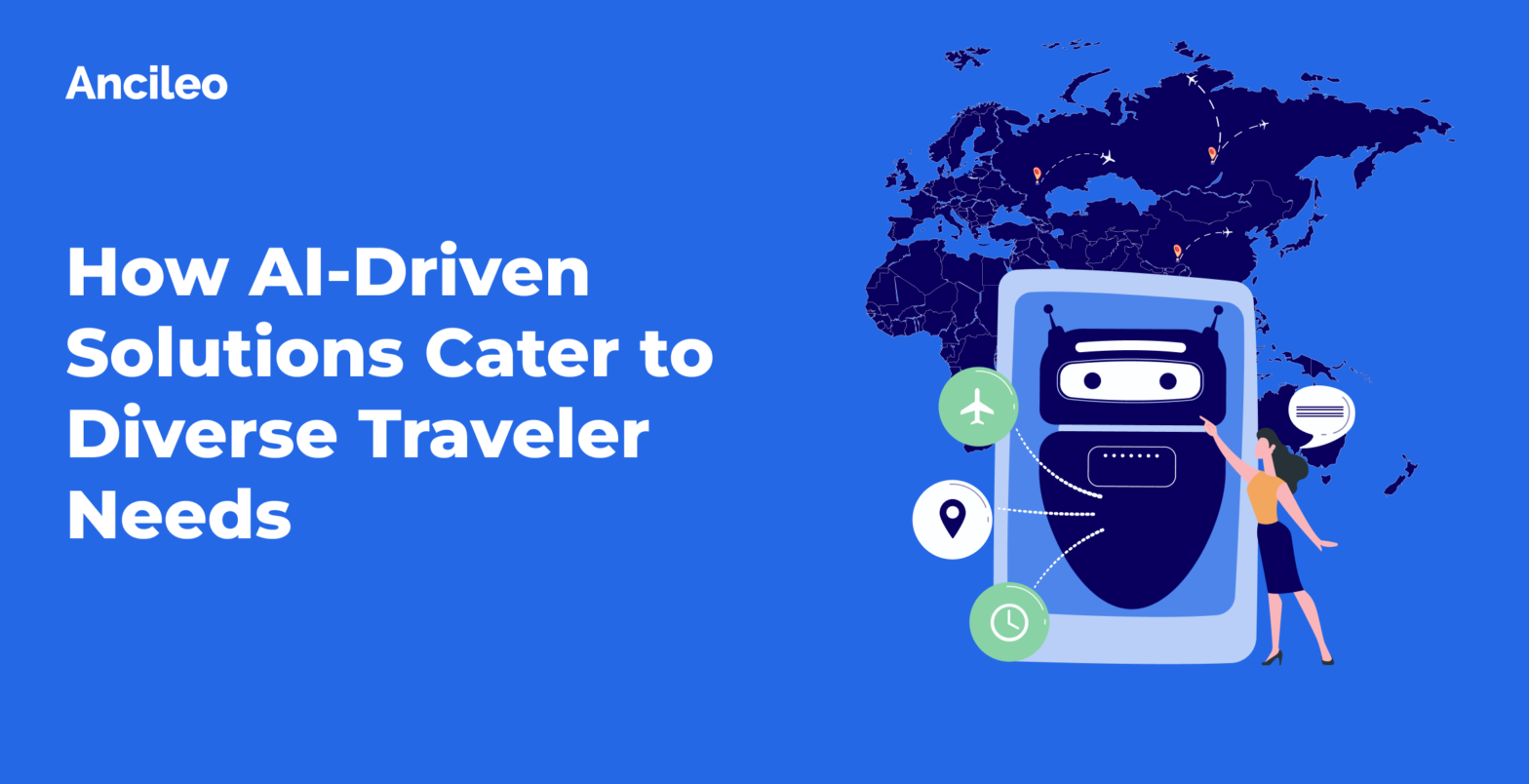
In the ever-evolving business travel landscape, staying ahead of the curve is not just an advantage but a necessity. As the world witnessed unprecedented changes in how people travel, artificial intelligence (AI) has become increasingly significant in reshaping the travel insurance sector. Business travel is no longer a one-size-fits-all concept.
AI in the travel industry is witnessing a paradigm shift, with emerging trends like eco-tourism, ski trips, cultural excursions, culinary journeys, golfing getaways, luxury vacations, and adventure travel. As the travel landscape diversifies, the demand for tailored insurance coverage that addresses the specific needs of different traveler types becomes more evident.
This blog will delve into the imperative need for travel insurance products that cater to diverse traveler types and their unique needs, showcasing how AI based insurance plays a pivotal role in revolutionizing coverage strategies.

Here is how AI in the travel insurance industry can revolutionize coverage.
AI is not just a buzzword but a powerful tool that enables insurers to customize products based on emerging travel trends. For instance, eco-conscious travelers seek insurance coverage that aligns with sustainable practices, while adventure enthusiasts require protection tailored to the risks associated with high-adrenaline activities. AI-driven solutions enable insurers to analyze evolving preferences and risks, leading to the development of specialized insurance products that cater to these unique needs.
Take the example of an insurance provider that utilizes AI algorithms to identify and understand emerging travel trends. By analyzing data from various sources, including social media, travel forums, and industry reports, the insurer can anticipate the rise of eco-tourism and design insurance products that specifically address the environmental concerns of conscious travelers. This level of customization meets the market’s demands and positions the insurer as a forward-thinking industry expert.
AI’s ability to process vast amounts of data in real-time allows insurers to offer seasonal and event-specific insurance solutions. For instance, travel risks and preferences vary significantly during peak ski season or major cultural festivals. AI algorithms can dynamically adjust coverage based on weather conditions, crowd density, and specific event-related risks. It ensures that travelers receive comprehensive protection that adapts to their unique circumstances.
Imagine a travel insurance product that automatically enhances coverage during hurricane season for destinations prone to such weather events. Through AI-driven insights, insurers can proactively adjust coverage to provide extra protection for travelers visiting these regions during high-risk periods. It safeguards the insured and demonstrates the insurer’s commitment to anticipating and mitigating potential risks.
To understand the tangible impact of AI in reshaping travel insurance coverage, let’s explore some real-world case studies where insurers have successfully integrated AI into their strategies.
In a notable development for the insurance industry, Blink Parametric has partnered with MAWDY Ireland, a global insurance and reinsurance company. The collaboration, initiated in October 2023, originally covered segments of the direct book of travel insurance business. Now, the Blink Parametric flight disruption solution is being integrated into MAWDY Ireland’s InsureandGo travel insurance brand, offering consumers direct access to a parametric-powered benefit.
Specifically, customers with platinum or gold policies will receive automatic notifications and real-time access to executive airport lounges or a cash payout alternative when facing flight disruptions exceeding three hours. Sid Mouncey, CEO of Blink Parametric, highlighted the success of this collaboration, emphasizing the tailored, real-time digital solution designed to meet the unique needs of a multinational travel insurer and brand.
Blink Parametric is recognized globally for its innovative travel InsurTech and parametric solutions. Specializing in addressing the increasing frequency and scale of flight disruption events caused by factors such as extreme weather conditions, Blink Parametric’s solutions aim to deliver operational efficiency by providing immediate, real-time claim resolution for high-frequency, low-value travel insurance claims. The partnership with MAWDY Ireland marks a significant milestone for Blink Parametric, showcasing its commitment to meeting the evolving demands of the travel insurance landscape through cutting-edge AI-driven solutions.
HelloSafe, a prominent insurance and financial product comparison platform in Canada, has recently forged a strategic partnership with soNomad, a specialized travel insurance company. Boasting over 3 million annual visitors to its website, HelloSafe aims to enhance the user experience by incorporating exclusive travel insurance offerings from soNomad into its comparison platform. Through this collaboration, HelloSafe users gain access to a diverse range of travel insurance options, enriching their ability to make informed decisions about financial products that impact their daily lives. Alexander Desoutter, the spokesperson for HelloSafe Canada, expressed enthusiasm about the partnership. Emphasizing the alignment with their mission to empower consumers to save money on everyday products.
Patrick Lavoie, Chief Strategy Officer at soNomad, echoed the sentiment, highlighting the shared objective between the two companies. HelloSafe and soNomad strive to provide Canadians with the most competitive and comprehensive travel insurance prices. Lavoie emphasized their commitment to presenting consumer-friendly solutions, including a low-cost model with exclusive products and introducing unique options and products tailored to the Canadian market. The collaboration between HelloSafe and soNomad exemplifies insurers adapting to market trends, leveraging AI-driven solutions to address the evolving needs of diverse travelers, and ultimately enhancing the accessibility and affordability of travel insurance for Canadian consumers.
In response to the evolving landscape of travel safety, AIG has integrated a feature into its Travel Assistance App. Collaborating with GeoSure, the new safety assessment feature leverages big data, artificial intelligence, and crowd-sourced reporting. And geospatial intelligence to offer users a hyper-local and hyper-personalized digital safety experience. This innovation enables travelers to access continuously updated safety information, providing granular safety ratings down to the neighborhood level in over 60,000 locations.
GeoSure’s GeoSafeScores™, ranging from 1 to 100, offers a comprehensive evaluation of safety conditions based on factors such as Physical Harm, Women’s Safety, Theft, LGBTQ+ Safety, Political Freedoms, Health & Medical, and Overall Safety. The lower the score, the safer the location, allowing travelers to make informed decisions about the safety of the areas they are visiting. Through advanced algorithms, GeoSure determines scores for each location, contributing to a holistic safety assessment. This integration exemplifies how AI-driven solutions can cater to diverse traveler needs by offering real-time, detailed. And inclusive safety information tailored to individual preferences and concerns.
Generali Global Assistance (GGA) has introduced the virtual Travel Insurance Assistant, a pioneering online automated system, which focuses on digitally transforming the company to streamline operations and improve customer interactions. The initiative encompasses the identification of processes that can be automated, testing technologies for insurance use cases, and enhancing employee skills to achieve better intercompany alignment. By leveraging artificial intelligence, machine learning, and robotic process automation, GGA aims to reduce the manual processing of data and documents, allowing employees to concentrate on delivering top-notch customer service.
Chris Carnicelli, the CEO of Generali Global Assistance, expressed enthusiasm about implementing these advanced technologies, emphasizing how they would empower the team and benefit customers. The Travel Insurance Assistant is designed to assist GGA’s direct customers select the most suitable travel insurance plan. By visiting the consumer website and answering six brief questions related to the destination, travel type, and pre-existing conditions. Customers receive personalized recommendations for travel protection plans. This one-stop-shop solution serves as a valuable resource. Providing comprehensive assistance to customers throughout their travel experiences and exemplifying GGA’s commitment to leveraging technology to benefit its clientele.
While integrating AI into travel insurance brings numerous benefits. Addressing potential challenges and ethical considerations associated with its use is crucial.
Managing large volumes of personal data requires robust security measures to prevent unauthorized access and data breaches. Insurers must invest in state-of-the-art cybersecurity infrastructure to safeguard sensitive information.
Besides that, obtaining informed consent for data usage is imperative. Policyholders must fully know how their data is collected, processed, and utilized. Transparent communication about data practices builds trust and compliance.
AI algorithms may inadvertently incorporate biases in the training data. This can result in discriminatory outcomes, impacting certain demographic groups more than others. Insurers must actively address algorithmic biases to ensure fair and equitable coverage.
The opacity of AI decision-making processes can lead to a lack of trust among policyholders. Insurers should strive for transparency, explaining how AI algorithms influence coverage decisions and premium calculations.
Navigating the complex landscape of data protection laws and regulations is challenging. Insurers must stay abreast of evolving legal frameworks to ensure compliance with data protection, privacy, and others. Relevant regulations in different jurisdictions.
The need for standardized regulations for AI in insurance can lead to inconsistencies and varying standards. Policymakers and industry stakeholders need to collaborate to establish clear guidelines for the ethical use of AI in travel insurance.
Integrating AI into insurance systems can be complex and require substantial technological investments. Ensuring seamless integration without disrupting existing operations is critical to successful AI implementation.
The effectiveness of AI models relies heavily on the quality and accuracy of the data they are trained on. Insurers must invest in data governance practices to maintain data integrity and prevent biases from skewed or inaccurate datasets.
Some policyholders may be uncomfortable with the idea of their behaviors and preferences being analyzed by AI algorithms. Insurers must communicate the value proposition of AI-driven solutions while respecting customer boundaries.
Understanding AI and its implications can be challenging for insurers and policyholders. An educational gap may exist. Requiring insurers to invest in customer education initiatives to explain the benefits and limitations of AI in travel insurance.
As we look toward the future of AI in travel insurance. The industry has vast opportunities for further innovation and adaptation. AI presents opportunities for insurers to innovate in risk prediction, claims processing, and customer engagement. Insurers can leverage AI to develop predictive models that anticipate emerging risks. Streamline claims processes for faster settlements, and enhance customer interactions through chatbots and virtual assistants.
The evolving nature of travel demands a proactive approach from insurers. Continuous adaptation to emerging trends and technological advancements is essential to remain competitive. Investing in AI capabilities and fostering. A culture of innovation will position insurers as leaders in the ever-changing travel insurance landscape. As the travel landscape continues to evolve, the integration of AI will be the key to providing comprehensive. Well-tailored coverage that instills trust and credibility in the minds of travelers worldwide.